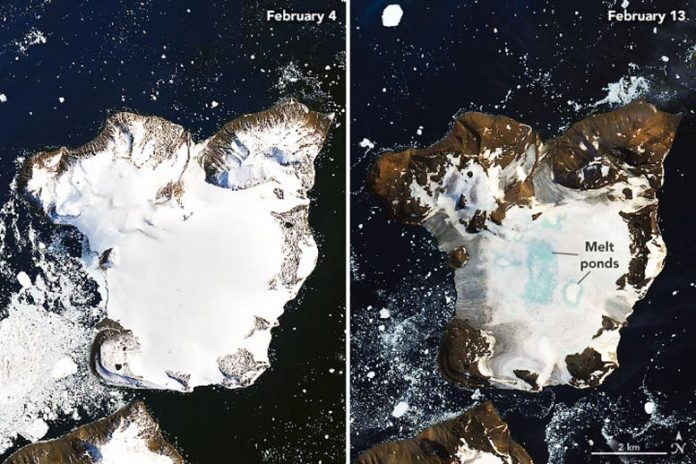NASA satellite pictures reveal the scale of “widespread melting” observed earlier this month. On February 6, weather station thermometers peaked at 18.3C (65F) degrees – about the same temperature as Los Angles, US, that day.
“I haven’t seen melt ponds develop this quickly in Antarctica. You see these kinds of melt events in Alaska and Greenland, but not usually in Antarctica,” said Mauri Pelto, a glaciologist at Nichols College, in a statement. Widespread surface melting was also observed by Pelto on the nearby Boydell Glacier.
Images taken by the Operational Land Imager (OLI) on Landsat 8 on February 4 and again nine days later show Eagle Island’s 1.5 square kilometers (nearly 1 square mile) of snowpack saturated with meltwater (blue circles below). Climate models suggest that the area saw a peak melt of 30 millimeters (1.2 inches) on February 6. In total, Eagle Island lost 106 millimeters (4.2 inches) of ice during the warm spell.
Rapid melting is caused by sustained high temperatures significantly above freezing, an anomaly that has become more common in recent years, according to NASA. A heat map taken using the Goddard Earth Observing System (GEOS) model also clocked record temperatures above 10°C (50°F) at 2 meters (about 6.5 feet) above the ground. High temperatures seen earlier this month are caused by a combination of meteorological events, including higher bouts of pressure centered over Cape Horn that allowed warmer temperatures to build while dry, warm foehn winds likely brought with them warmer air to the continent.
This month’s heatwave marks the third melt event of the Antarctic 2019-20 summer, following warm spells in November 2019 and January of this year.
“If you think about this one event in February, it isn’t that significant,” said Pelto. “It’s more significant that these events are coming more frequently.”















